- Home
- Lin Carter
The Volcano Ogre Page 2
The Volcano Ogre Read online
Page 2
“Like a burning troll,” he breathed. “Lava running down all over him ...”
Señor Valdez was kneeling next to the body of poor Tommy Kahua. His face was pale, tense, anxious, and tears stood in his brown eyes.
“Tommy,” he said in a broken voice, “Tommy, who did this to you — who?”
“The fire devil,” said Tommy in a clear, strong voice. Then he lay back on the warm rock and was dead.
Señor Valdez took a red bandanna handkerchief out of the hip pocket of his white duck trousers, unfolded it, and spread it so that it hid the face of Tommy Kahua.
He directed two of the biggest and strongest of the men to pick up the body and carry it down the mountain. The men nodded and stooped to do so. Then they froze, staring.
A few patches of earth clung to the bare rock, here and there. Thin, scruffy grass grew on one such bit of soil, very near where Tommy Kahua had fallen. Amidst this hummock of grass a footprint could clearly be seen. It could be seen so clearly because the heat of it had blackened the grass to soot, and because small flames smoldered and flickered in the grass that stood around the edges of the print.
It was like a man’s footprint. but larger. More like that of a bear or of a great gorilla. It had no toes, just one flat, broad pad. And it had seared the grass like red-hot iron.
The men raised their frightened eyes and looked up the slope.
Other prints could be seen, soot-black smudges against bare brown rock.
One set of prints came shambling down the slope from the mouth of the crater to where Tommy had been when the thing, whatever it was, had grabbed him and had killed him with the heat of its burning paws. The second set of prints ascended the slope and vanished over the lip of the crater, where the hot vapor flew. Dribbles of molten lava were splattered in a trail matching the black paw-prints. The lava was only yellow-hot by now, having cooled a little.
Something monstrous and incredible and alive had come through the boiling vapor, come out of the furnace-heat of that crater. Tommy had seen it, and screamed, and it had killed him by laying its burning paws upon him. Then it had lumbered back up the slope and vanished into the boiling cauldron of the crater again.
The men looked at one another, but said nothing.
There was nothing to say, really.
On their way back down the mountain with Tommy Kahua’s body, one of the men turned to Señor Valdez.
“What shall we do?” he asked worriedly. “The police — ”
“Can do nothing against a monster, a fire devil,” said Señor Valdez firmly, shaking his head.
“What then?”
Señor Valdez rubbed one hand across his brow thoughtfully. When he took away his hand, his eyes shone with determination.
“In my house I have a copy of the latest issue of a magazine,” he said. “The name of that magazine is Na-tion-al Geo-graph-ic. In the magazine there is an article about a man who helps people. He is a wise man, and a good man, of great wealth and power. He travels all over the world fighting evil-doers and helping people who are in trouble. In one of the little countries in South America, just recently, this man and his assistants helped the poor Indians who were in terror of a man-killing monster. While he was in their country, fighting to destroy this monster, he made a remarkable discovery. He found an ancient city of the Mayas, lost in the jungles for many ages, yet still inhabited by the descendants of the ancient Mayas. He published a report on the spoken Mayan language, as still used by their living descendants, which solved the mystery of how this forgotten language was pronounced. For this he has just been given the Nobel Prize of many dollars. This money he donated to the government of the South American country, so that they might build hospitals, libraries, and schools.”
Señor Valdez drew a long breath.
“His name is Prince Zarkon. He lives in Knickerbocker City. I am going to call him on the radio. Perhaps he will come to help us.”
“Perhaps so,” murmured the man at his side, impressed but yet skeptical. “But why should he? There must be many people who need his aid. Why should he come here?”
“Because I will pay him very much money to do so,” replied Señor Valdez. “He can build hospitals and schools with that money, if so he wishes. But I will offer him much, for am I not a man of wealth?”
“You are,” admitted the other man, “the richest man on the whole island of Rangatoa.”
“It is so!” Señor Valdez smiled with complacent pride. “In the great bank at Mantilla I have a bank account. In it for twenty years I have deposited my money. It was to go for the education of my children, that money, but alas, only one son was given to me, and now God has taken him. So I will pay all of this money to the Prince Zarkon if he will help us. There is seven hundred and thirty-nine dollars in the bank at Mantilla in my name!”
“So much! Madre dios,” marveled the other.
“Even so much,” said Señor Valdez, with pride. “So, you see, my friend, surely the Prince Zarkon will come to help us. At least I will call him on the radio and ask it. Can he say no?”
Together they went down the mountain and into the village, carrying the dead man who was the fire devil’s first victim in many centuries.
But not his last!
CHAPTER 2 — The Nonplussing of Doc
The radio message that Señor Valdez broadcast from the island of Rangatoa in the Pacific was received by sensitive instruments located within one of the brownstone tenement buildings on a block on the Upper West Side of Knickerbocker City, halfway around the world.
To the eye, this block looked in no way particularly different from any of the hundreds of such to be found in the older residential neighbors of the giant metropolis. Battered ash cans were piled between flights of front steps; lace-curtained windows gazed out on a street where dogs were being walked and children played noisily; rooftops bristled with TV antennae and chimneys; geraniums bloomed in window-boxes; cars were parked at random along the curb. At the end of the block flowed the dark waters of the Henry Hudson River, amidst which a small, tree-grown isle could be glimpsed; beyond rose the palisades of New Jersey.
A closer look would have, perchance, revealed that none of the windows on this block could be seen into: shades were drawn or heavy drapes discreetly closed. And by one of the doors a small, unobtrusively-placed brass plate might have caught the eye. It bore no name or legend, but a single letter in the ancient Greek alphabet: omega.
Only a few high city officials and Federal officers knew that, in actuality, this entire block of buildings was a system of false fronts concealing an immense structure built like a fortress, generating its own power and breathing its own carefully recycled air. The innocent-seeming, ordinary-looking facade hid walls of battleship steel, braced and reinforced to resist anything this side of a rampaging tank. And the windows were of heavy, bullet-proof plastic, optically ground to resemble ordinary plate-glass, but tough enough to stand up to anything smaller than a bazooka shell.
For this building housed the Omega group, the most secret and powerful private crime-fighting organization in the world. Behind these fortress walls were the apartments where lived the five Omega men and their master. Herein, as well, were advanced laboratories and machine shops; a fully-equipped hospital facility; storerooms and research libraries; a basement garage housing a fleet of powerful, bullet-proof vehicles of every type and description; a communications center so sophisticated that it could instantly place the Omega men in touch with every foreign capital; computers, Weissmann projectors, telegraphy equipment, a private rooftop observatory; and sealed, fireproof vaults containing a host of ingenious instruments and scientific marvels whose very existence was unsuspected by the outside world. Beneath folding rooftop bays, a sleek helicopter of advanced design stood fueled and ready to whisk the Omega men to a private airfield located on the island in the river, where hangar facilities were hidden behind clever camouflage which protected them from scrutiny. In one of the upper rooms stood ranked file
cabinets containing detailed dossiers on over thirty thousand known international criminals, and automatic radio equipment which monitored and recorded police calls in forty major cities. Such, then, was Omega — the unsleeping sentinel of liberty, the unrelenting foe of super-crime, the tireless champion of law and order.
It was late afternoon in Knickerbocker City when the call for help was received from the distant Luzon islands. The five Omega men and Chandra Lal, their servant, had gathered in the study upon the instructions of their leader, whom they expected momentarily.
The study was luxuriously appointed with every appurtenance that exquisite taste and unlimited wealth could afford. Thousands of volumes marched in rows on mahogany bookshelves lining the walls; priceless Flemish tapestries glowed in the corners; superb oils by Matisse, Corot, Gauguin, and other masters gleamed in expensive gold frames, while a rare Persian carpet spread its gorgeous colors underfoot. A fresh-laid fire crackled on the grate of an ornate fireplace of Florentine marble, it being a raw, blustery spring day.
Standing before the fire, two men, strikingly. dissimilar in every detail of their appearance and background, stood rubbing their hands before the blaze, exchanging a rapid-fire verbal duel of insults. One of these was a lanky, sallow-faced, long-legged gentleman of theatrical manner and Italian extraction, with a waxed goatee, satanic mustachios, and lustrous blue-black hair. This was Nick Naldini, former vaudevillian stage magician, escape artist, and reformed con-man and gambler. He had a long-jawed, sardonic face and lazy, amused black eyes, and looked rather like the actor John Carradine gotten up to impersonate Count Dracula. His lounge suit was in impeccable taste, but the total effect was marred by a red velvet smoking jacket and a gaudily-colored silk scarf about his throat.
The man beside him, whose fiery, curled thatch barely reached the magician’s bony shoulders, was a husky little bantamweight Irishman with a snub nose and blue eyes, who wore tan slacks and a turtleneck sweater of shamrock-green. This former boxer, and judo and karate expert, was Aloysius Murphy Muldoon, called “Scorchy” by his comrades in peril, the sobriquet having been bestowed upon the feisty little redhead by an admiring sports reporter, in obvious allusion to the speed of his flying fists, which fairly “scorched” the air.
The running feud between these two was of long duration but meant little, for they were actually the firmest and closest of friends, although either would have gone to the stake rather than admit to the fondness and affection each felt for the other.
Seated on the two couches which faced the fire were three other men of unusual appearance. One, a clumsy, lumbering oaf of a man with a slab-sided, dull-eyed face and lank hair of nondescript color, who sat moodily cracking the knuckles of his overgrown paws, looked like a shambling halfwit. Actually, he possessed one of the most remarkable intellects in the world, having been born one of those rare individuals with an eidetic memory, able to remember every fact or figure they have ever read, every face they have ever seen, every voice they have ever heard. This man, Theophilus “Doc” Jenkins, had put his camera eyes, tape-recorder ears, and computer brain to the service of Omega and its mysterious master.
Beside the big, pale-faced oaf with the miraculous mind sat a tanned, handsome, athletic young man whose guileless features and trim physique caused feminine hearts to flutter on five continents — for he had never visited Antarctica. This was Francis “Ace” Harrigan, former crack test-pilot and a famous air ace who had downed forty enemy planes over Indo-China.
Next to him sat a frail, waspish little man with a starved, peevish face and scrawny arms. This skinny little scarecrow was a brilliant scientific genius named Mendel Lowell Parker, an electronic wizard deemed the peer of Tesla and Marconi, whose first two names, as well as his Edison-like brain, had earned him the nickname of “Menlo” Parker, in jesting tribute to Edison himself, the “wizard of Menlo Park.” A confirmed bachelor with a furious temper, Menlo could never decide whether he disliked women more than he disliked his nickname, or the other way around.
These three were listening — with varying degrees of amusement, boredom, and exasperation — to the exchange of wise-cracks and insults that was going on between Nick Naldini and Scorchy Muldoon.
“Say, pint-size, it just occurred to me — you could probably make a few bucks renting chest space on that vile-colored sweater of yours to the Irish Tourist Office for a small advertisement,” Nick was drawling in his hoarse, whiskey voice. “It would have to be mighty small, I guess, due to the size of the billboard.”
Scorchy, who had donned the shamrock-hued garment expressly to annoy his crony, who affected a violent distaste for the verdant color, which (he said, with small, fastidious shudders) always reminded him of Muldoon’s Hibernian ancestry, flushed at this crack. Bristling, he balled hard fists as if about to wade into a brawl, which was his second-favorite form of idle amusement, his first being the baiting of Naldini.
“Why, you fugitive from a Mandrake the Magician look-alike contest, another crack about me height and I’ll be after showin’ yez I kin take on a skinny beanpole wid one fist tied behoind me back!” the ex-boxer snarled, lapsing into his brogue as he generally did whenever his dander was up.
As for Nick Naldini, the lanky stage magician merely smiled.
“A contest between us, my pigmy pugilist,” he drawled laconically, “would be contrary to the Marquis of Queensbury rules.”
Scorchy scowled. “Hozzat, long, lean, an’ larcenous?”
“Due to a certain deficiency in your sum total of inches, you would perforce be hitting me below the belt,” smirked the magician with a twinkle in his eye.
“Why, you broken-down, third-rate Houdini, Oi’ll be after stranglin’ yez on yer own chin whiskers, y’ long-legged galoot! Lemme at ’im, fellas —”
Chuckling, Nick ducked behind a table, fending off the furious little fighter.
Just then a tall, swarthy Hindu, his head wrapped in an immaculate turban, quietly entered the room, bearing a tray on which cups and a coffeepot were arranged.
“Hey, Chandra Lal,” Ace Harrigan spoke up, happy to derail the current direction of the conversation, “you know when the chief is coming up?”
The tall Hindu shook his head, setting the tray down on the coffee table. “The sahib has been engaged since early morning with his latest experiments,” said the Rajput deferentially. “It is not for Chandra Lal to say when he will be finished.”
The five Omega men accepted the cups which the Hindu filled with steaming brown fluid, and sipped with lip-smacking gusto. Until the Indian manservant had joined them a little while ago, they had reluctantly endured Scorchy Muldoon’s cooking. The peppery little Irishman fancied himself a gourmet chef, but the actuality was that he couldn’t even boil water without ruining its taste. Engaged in drinking the delicious beverage, none of them noticed as a section of bookshelves opened smoothly in the wall to reveal a hidden elevator which connected the big study with the underground laboratory and suite of rooms occupied by their master, who now entered and stood for a moment, observing them.
The man who had just entered the room from his secret sanctum beneath street level seemed at first glance an ordinary-looking personage. His height was an inch or two over six feet, which meant that he was dwarfed by the towering hugeness of Doc Jenkins, and his physical development was so trim and perfectly symmetrical that he looked slender enough, in comparison to the brawny build of Scorchy Muldoon. It was only at second or at third glance that you began to notice the unusual details of his appearance.
His complexion was a strange, tawny shade suggesting the presence of Oriental blood. His features were of classic perfection, literally as handsome as those of a Greek god — in point of fact, his visage bore a startling resemblance to the features of the marble Perseus of Canova, if not indeed to the Apollo Belvedere itself. Had his superbly regular features not possessed an impassive and majestic calm, they might have suggested effeminacy in their striking beauty. But his eyes, large, deep-set,
wide-apart, and of black magnetic fire hinted at the force of character and strength of will and powerfully masculine maturity this seemingly-young man concealed within him.
His perfectly-proportioned figure was dressed in a turtleneck pullover made of stretch fabric in gunmetal gray. Gray, too, was the supple suede jacket and close-fitting slacks he wore, and his suede shoes with rubber soles were of the identical hue, which, for some reason, he usually affected. His sleek head of hair was of the precise shade of gray as his clothing and was arranged in meticulous locks across his brow in a fashion curiously similar to the antique Roman portrait busts in the International Museum of Art on the east side of Central Park.
His brow was spacious, noble, high, denoting an intelligence many times superior to that of the ordinary man. In truth he was not in any sense of the word ordinary: out of nowhere he had appeared, some ten years earlier, in the small Balkan country of Novenia, whose strategic importance was fully recognized both by the Western and by the Eastern powers, due to its control of the only known source of the rare metal rhombium, vital to the generation of nuclear power and the manufacture of atomic weapons. He had introduced easy, inexpensive methods of processing rhombium, overnight transforming the troubled little country into a wealthy and powerful nation whose grateful populace, reviving the ancient regalia of an extinct house, had made him their monarch. Before abdicating the throne in favor of the model democracy he swiftly established, he had written a new constitution now recognized as one of the noblest and most civilized of democratic charters penned since the American Constitution itself. Retiring to self-exile in the United States, under the diplomatic immunity granted with full Congressional approval to him as a respected former head of state, he had registered his patents on the rhombium process which today had made him one of the wealthiest private citizens on earth. This immense fortune he dedicated, as he had dedicated the remainder of his life, to a secret war against those super-criminals who used the wizardry of advanced scientific technology to gain a hold on the superstitious fears of common men.

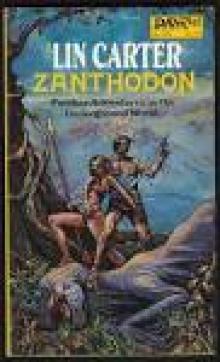 Zanthodon
Zanthodon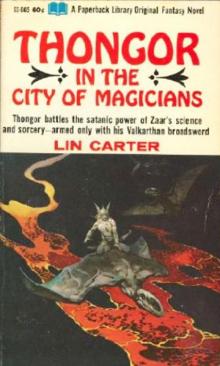 Thongor in the City of Magicians
Thongor in the City of Magicians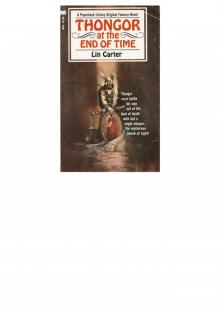 Thongor at the End of Time
Thongor at the End of Time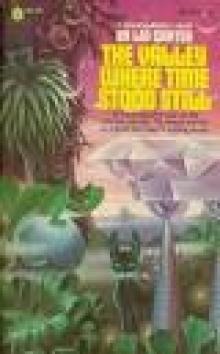 The Valley Where Time Stood Still
The Valley Where Time Stood Still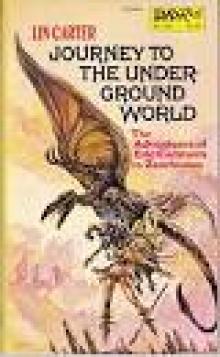 Journey To The Underground World
Journey To The Underground World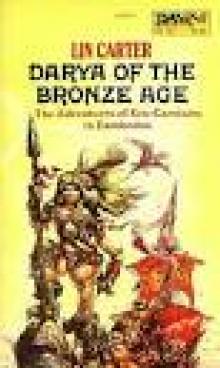 Darya of The Bronze Age
Darya of The Bronze Age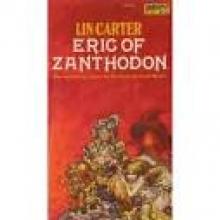 Eric of Zanthodon
Eric of Zanthodon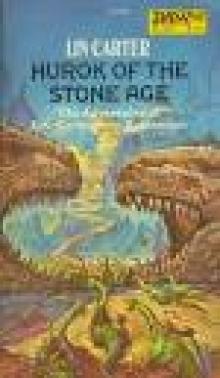 Hurok Of The Stone Age
Hurok Of The Stone Age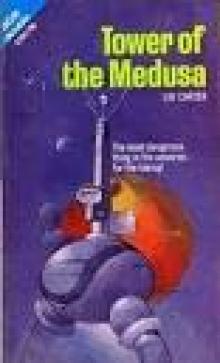 Tower Of The Medusa
Tower Of The Medusa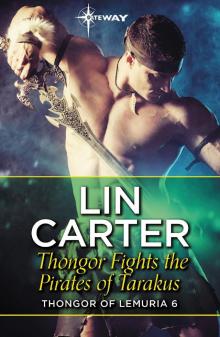 Thongor Fights the Pirates of Tarakus
Thongor Fights the Pirates of Tarakus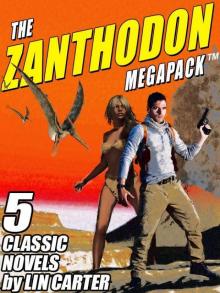 The Zanthodon MEGAPACK ™: The Complete 5-Book Series
The Zanthodon MEGAPACK ™: The Complete 5-Book Series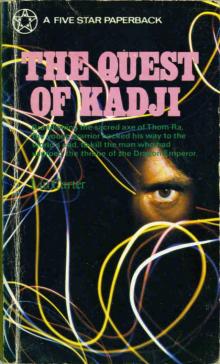 The Quest of Kadji
The Quest of Kadji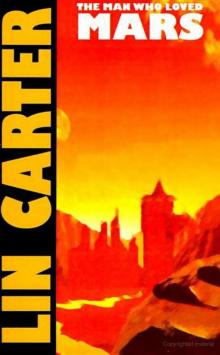 Lin Carter - The Man Who Loved Mars
Lin Carter - The Man Who Loved Mars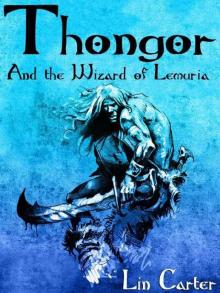 Thongor and the Wizard of Lemuria
Thongor and the Wizard of Lemuria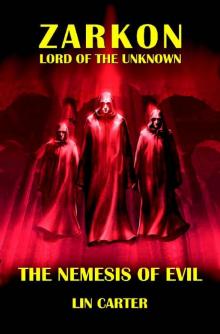 The Nemesis of Evil
The Nemesis of Evil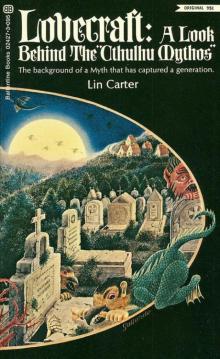 H.P.Lovecraft: A Look Behind Cthulhu Mythos
H.P.Lovecraft: A Look Behind Cthulhu Mythos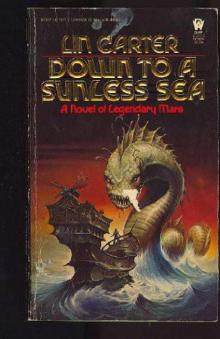 Lin Carter - Down to a Sunless Sea
Lin Carter - Down to a Sunless Sea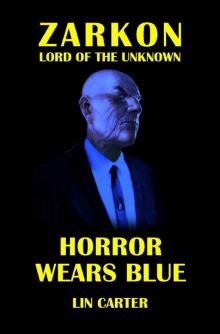 Horror Wears Blue
Horror Wears Blue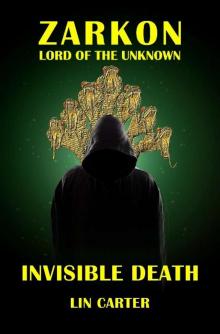 Invisible Death
Invisible Death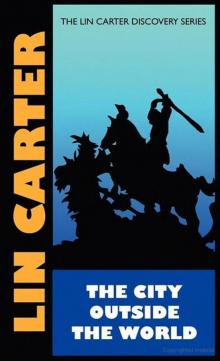 Lin Carter - The City Outside the World
Lin Carter - The City Outside the World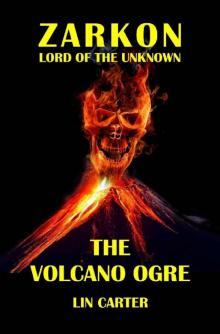 The Volcano Ogre
The Volcano Ogre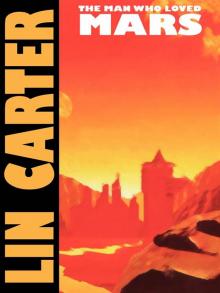 The Man Who Loved Mars
The Man Who Loved Mars